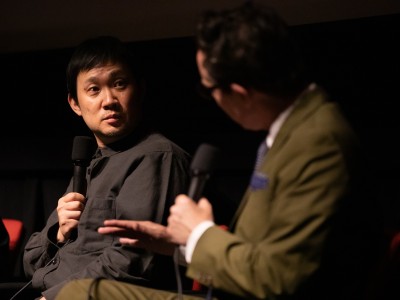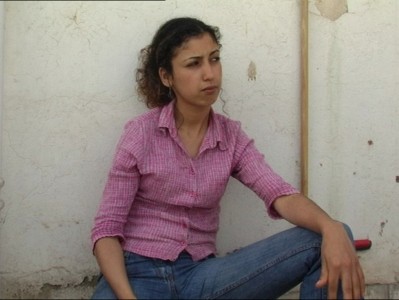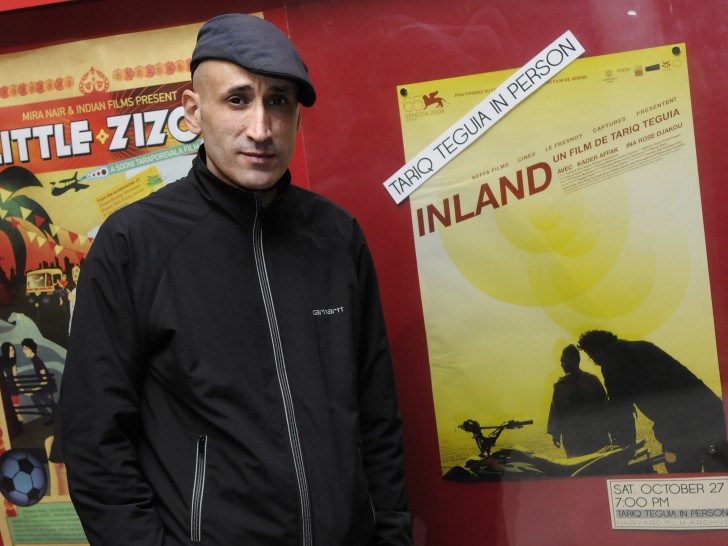
Inland (Gabbla) introduction and post-screening discussion with Haden Guest, David Pendleton and Tariq Teguia.
Transcript
John Quackenbush 0:00
October 27 2012, the Harvard Film Archive screened Inland. This is the recording of the introduction and the Q&A that followed. Participating are HFA Director Haden Guest, HFA Programmer David Pendleton, and filmmaker Tariq Teguia.
Haden Guest 0:20
[BEGINNING AUDIO MISSING] –this is called Inland. There is an impulse towards abstraction towards a type of drifting floating narrative in Teguia’s work and this is something I think that's embraced to the fullest extent in Inland. It's a really remarkable film. It's hypnotic. I think the best road films are sort of trance films at the same time. And Inland is both of those. It's also a geopolitical meditation of sorts about the state of Algeria, the state of northern Africa, the state of much, much more than that. I think that's something that's open for discussion.
So I want to thank, of course, the McMillan Stewart foundation. And here tonight is Nancy Murray, one of the foundation's trustees. I want to give her a round of applause [APPLAUSE] and thank her and the work of the foundation. I also want to thank our partners, the Film Study Center, here at Harvard, especially Lucian Taylor, Ernst Karel—who's also here tonight—and the wonderful Cozette Russell. So let's give them a round of applause as well.
[APPLAUSE]
And now with no further ado, please join me in welcoming Tariq Teguia.
[APPLAUSE]
Tariq Teguia 1:52
[SPEAKS FRENCH]
David Pendleton 2:44
[TRANSLATING:] Good evening or good evening, again, to those of you who were here last night. Thank you Haden for the wonderful introduction. And you're quite right to mention Africa. In Algeria, sometimes we have a tendency to forget that we're a part of that continent. But in fact, in Algeria, we're also Arab, we're Berber, we’re all of that. Andone of the things that the film is trying to do is to sort of resurrect the map, redraw the map, to replace Algeria in that context. And so what I would ask you to do for the next two hours and twenty minutes, is to pay attention to lines, to trajectories, to speed, and to duration. Thank you very much.
[APPLAUSE]
------
Haden Guest 3:42
Thank you so much for sharing this wonderful film with us. It's really, it's really quite stunning. And before taking questions from the audience, I wanted to ask a few of my own. And something that I find really fascinating about this film…. Typically, we learn more about a character in the course of a film. And here, Malek, if anything, seems to disappear slowly in the film. What we know of him at the beginning when we have hints of this past life, of his life, of him, we know of his profession, but then he gradually seems to be stripped down. He speaks less and then quite literally, he is of course, struck by the scorpion at the end. So it's a figure that seems to be slowly disappearing, almost melting in the course of the film. So I was wondering if you could talk a little bit about this. You were speaking about trajectories at the beginning of this. To me, it seems like one of the most pronounced trajectories of the film.
Tariq Teguia 4:52
[SPEAKS FRENCH]
David Pendleton 6:16
[TRANSLATING:] I'll try to answer that. I think I understand your question, Haden. Yes, the protagonist is in a process of disappearance. We tried from the very beginning to give him a sort of transparency. He's made up of contours. He's not really solid. And so this voyage, this trip, that he's on, is a process of disappearance which perhaps maybe even has a mystical aspect to it depending on what the what the spectators think. He's a little bit like the character of Ginsberg in “Howl.” In the prologue to “Howl” by William Carlos Williams, he talks of Ginsburg's life as a fall and then a kind of a redemption or a transcendence after that.
Tariq Teguia 7:12
[SPEAKS FRENCH]
David Pendleton 7:28
So he undergoes this process of simplification so that by the end he himself becomes a rock just as the girl is a stone.
Haden Guest 7:41
And yet we also have this really intriguing coda to his character which seems as if it's an image perhaps from the afterlife or some sort of dream, where suddenly she's in the bright sunlight; he's suddenly in almost this twilight speaking to this father figure, this boss, this figure from the past...
Tariq Teguia 8:08
[SPEAKS FRENCH]
David Pendleton 8:33
Yes, thank you for noticing that. Yes, at the end of the film, he's basically in another time. He's in another space or another time from hers. And so yes, there's a there's a gap between the twilight—which is him—and that sunlight which is her. But the twilight is not death.
Tariq Teguia 8:56
[SPEAKS FRENCH]
David Pendleton 8:59
[TRANSLATING:] It's, again, a question of distance.
Haden Guest 9:05
I’d love to talk about the figure of these intellectuals that suddenly burst into the film at different moments, like a sort of punctuation. It seems to me that these are these forces that are all about speech. They're all about the discourse and this sort of frenetic speaking and they're talking over one another, as opposed to, you know, these figures wandering silently through the landscape. And then we even see them appear—two of them, I think—and they're wandering and they're just sort of talking feverishly as if they can't stop speaking as characters who aren't really identified, but nevertheless, they seem to be some sort of lifeforce, some sort of counterforce, as opposed to these other characters. I was wondering if you wanted to talk about that.
Tariq Teguia 10:00
[SPEAKS FRENCH]
David Pendleton 11:21
[TRANSLATING:] Yes. Thank you for noticing this. There is a discourse that the activists have in the film. The problem is that they're enclosed in a cell in the sense that both they are a group, a cell as a group, but also a cell as in prison. They're not ridiculous. What they say makes a lot of sense. They're activists but they don't seduce, they don't persuade, and that's the problem. And in the film, you can see that Malek used to be a part of that world but he has evolved. He's gone on to do other things.
Tariq Teguia 11:58
[SPEAKS FRENCH]
David Pendleton 12:36
[TRANSLATING:] And yes, Haden, as you mentioned, there is a scene where I've thrown two of these activists, these intellectuals, on the road. They're going off on on their own and it's just like I was talking about with David, making a trip to Walden while I'm here, there's certainly a reference to the this tradition in American letters and philosophy of these figures who go out on the road, who go out walking like Thoreau or like Burroughs.
Tariq Teguia 13:01
[SPEAKS FRENCH]
David Pendleton 13:14
[TRANSLATING:] And so like the figures in Rome Rather Than You—who leave their father, who give up the Father, give up the state, desert the tribe, etc.—these two are doing that as well. And also it's libertarian—well, not libertarian in the sense of the political party—but yeah, a “liberational” practice, you could say.
Haden Guest 13:41
The shimmering sort of mirage at the end—well, maybe not a mirage—but this pure image of light of this border, you know, when the girl says “I can see the border. We can't see anything.” Effectively, it's a sort of abstract haze rather than a line.
Tariq Teguia 14:06
[SPEAKS FRENCH]
David Pendleton 14:15
[TRANSLATING:] Yeah, the only line that we don't see in the film is the line that's the border because it's actually buried in the dust.
Haden Guest 14:21
And just the effect of this sort of sun blindness… I was wondering if you want to talk about how you achieve this effect, for instance. I mean, was this–?
Tariq Teguia 14:33
[SPEAKS FRENCH]
David Pendleton 14:54
[TRANSLATING:] It wasn't an effect in the sense of a special effect at all. It was just the sunlight, the dust raised by the trucks that were passing and the camera that captured it.
Tariq Teguia
[SPEAKS FRENCH]
David Pendleton
[TRANSLATING:] White on white, or “Blonde on Blonde,” as Dylan would say.
Tariq Teguia
[SPEAKS FRENCH / LAUGHS]
David Pendleton
[SPEAKS FRENCH]
Haden Guest 15:24
Maybe let's take some questions from the audience because I'm sure there are some. If you'll wait for the audience microphones that are on either side.
Tariq Teguia 15:31
[SPEAKS FRENCH]
David Pendleton 15:53
He is thanking me. Basically we presented the film in a digital copy because the quality of the light is so important at the end and the only 35 millimeter print that exists with subtitles has gotten kind of scratched at this point. And so we digitized it and did live subtitling and he's thanking me for it, but I also want to thank John Quackenbush, our excellent projectionist who went above and beyond for this show. So thank you, John. He's back in the booth.
[APPLAUSE]
Haden Guest
So let’s take some questions, comments if there are… We have one right here.
Audience 1 16:44
I'd be curious to know about how film responds to the evolving political realities in North Africa, the particular moment in which the film was made and the question if Algeria will see revolution similar to some of its neighbors or not, and also within the context of the migration to Europe through Algeria, how does that fit into the political atmosphere and what did you try to say about it, if anything, in the film?
David Pendleton 17:26
[TRANSLATES QUESTION INTO FRENCH]
Tariq Teguia 17:56
[SPEAKS FRENCH]
David Pendleton 18:08
First of all the film was made in 2007, so actually it was ahead of and perhaps anticipates the events of the Arab Spring.
Tariq Teguia 18:23
[SPEAKS FRENCH]
David Pendleton 19:53
Yes, so, it's true that I was trying to present what I saw as the present of Algeria, a postwar Algeria, although as I said last night, the civil war that people often say had finished hasn't really completely ended. And so yes, I wanted to show these people who were talking about or dreaming of another Algeria, one that would be less authoritarian and more democratic. At the same time, yes, for a long time, there's been this phenomenon of people from sub-Saharan Africa, crossing into Algeria to get to Europe, but I also wanted to evoke the young Algerians themselves who tried to leave for Europe. And I think all of this attempt at migration is an expression of a desire to live, a very strong desire to live. And that's what I wanted to show in the film.
Haden Guest 20:53
Other questions? We have one in the very back.
Audience 2
[SPEAKS FRENCH]
Tariq Teguia
[SPEAKS FRENCH AND DAVID STOPS HIM]
David Pendleton 21:35
The question is: “I really appreciated the film and I was particularly struck by the soundtrack and I was curious about how you chose the music for the film and what was the relationship between the music and the image?” He started by saying, “Well, the film is the relationship between the music and the image.”
Tariq Teguia 21:52
[SPEAKS FRENCH]
David Pendleton 22:24
[TRANSLATING:] Actually, a film like this needs a lot of location scouting, and so a lot of what you hear in the film is music that I listened to when I was going on these trips to do the location scouting.
Tariq Teguia 22:38
[SPEAKS FRENCH]
David Pendleton 22:44
Basically, to make a film, you have to live things, and then you have to invent them in order to write them, as it were.
Tariq Teguia
[SPEAKS FRENCH]
David Pendleton
[TRANSLATING:] So that's how I made the soundtrack.
Haden Guest 23:01
Yes. If you’ll wait for the microphone, which is right there.
Audience 3 23:04
Oh, thank you. Thank you so much. I guess I'll proceed in English. You mentioned Thoreau and also Ginsburg, but I couldn't help but feel that this was a powerfully existentialist film. And it gets very interesting, in the sense that there's the theme of creation of the self through action, and this sort of sense that the intellectuals are—they're not absurd, per se—but there's sort of a sense that they don't exist until they can come out of this cell, as you've put it, and emerge into the world and actually move and do things and then suddenly, they're alive. So I wonder if that was intentional, whether there's a bit of Sartre sort of hanging over this, and with it, the history of existentialist thought as it relates particularly to Algeria, but sort of the third world in general. It's interesting to think about how this way of thinking about about individual action, about responsibility, about whether whether this is still a relevant way of thinking about the problems of human liberation everywhere but particularly somewhere like Algeria
David Pendleton 24:42
[TRANSLATES THE QUESTION IN FRENCH]
Tariq Teguia 25:36
[SPEAKS FRENCH]
David Pendleton 26:18
[TRANSLATING RESPONSE:] No, I wasn't really thinking about that. I mean, as far as the intellectuals are concerned. Intellectuals, their role is to think; there's no shame in thinking. And as far as the rest of it, I mean, it's just as important to think or to try to do something as it is to do something. I don't really know about this existentialist aspect of this.
Audience 4 26:56
That was incredibly powerful and very moving. And I wonder when the girl made the choice to go back, and not to go on to Europe—I mean, you could have had them going through to Europe, and that could have been one choice. But instead, she made the choice to go back and I got the feeling he was on a voyage of discovery too—about his own country, his own past, where Algeria had come from—especially meeting the shepherds and having the coffee in the middle of the desert. And I wonder if that was in your mind. There was this overtone when they were in the train, which was utterly fantastic, almost a dream sequence in the train. And then the overtone for this country was very much all of the hobos who would go to the promised land of California that way. And I wonder in your mind, whether you saw returning to staying in Africa because you said that this is knitting people to the continent of Africa, whether that was really a deliberate choice to have them then be part of the African continent.
Tariq Teguia 28:09
[SPEAKS FRENCH]
David Pendleton 29:10
[TRANSLATING HIS RESPONSE:] I'm not sure about when that choice happens, but I knew that what I wanted to do was to twist the usual trajectory and so that rather than, yes, going up to Europe, it's a sort of a reinvestment in Africa but it's also a question of Algeria thinking of itself, thinking of itself inland and again, as part of this continent, as opposed to the emphasis on the Mediterranean coast and Algiers.
Tariq Teguia 29:38
[SPEAKS FRENCH]
David Pendleton 30:13
[TRANSLATING:] I don't really think about the motivation of my characters. I have a hard time actually drawing in those kinds of contours. And so, ultimately, I don't ask myself the question.
[SPEAKING TO TARIQ:] Although what she was saying was, in a way, what you said, which is that regardless of the motivation of the individual, the impact of the film has is, as you say, to sort of renew these ties between between Algeria and the sub-continent.
Tariq Teguia 30:47
[SPEAKS FRENCH]
David Pendleton 31:49
[TRANSLATING:] When I'm writing the film, when I'm shooting the film, when I'm editing the film, I'm thinking of it as a kind of a plane, a surface, and it's a landscape, a landscape of events. And so sure there are holes in the story, there are holes in the storytelling, but above all, what concerns me is to construct a map—as if drawing a map from one point to another, a landscape of events.
Haden Guest 32:24
Well, thank you so much. This is really wonderful. Are there any other questions? Oh, yes please.
Audience 5 32:33
I’m just curious about how you found and what it was like to work with the principal actors, but also these guys, like the shepherds, or the guys working at the oil—or whatever that was—it looked like an oil rig kind of thing.
Tariq Teguia 32:52
[SPEAKS FRENCH]
David Pendleton 34:03
[TRANSLATING RESPONSE:] Most of the actors I found along the way, for instance, for the scene with the shepherds in the desert, we needed shepherds. We showed up really early. A shepherd showed up and I said, “Do you want to be in the film?” And he said, “Sure.” And I loved using him because he had this sort of beatific face almost, you know, out of like these saints and Christian iconography and his smile, you know in the shot where he smiles, it's almost something out of Pasolini. Then in the case of the scene with the oil workers where they stopped to get some oil, they were there, I asked them if I could film them working and they said “Yes.” And I did and that was them actually doing their work about while we filmed.
Tariq Teguia 34:49
[SPEAKS FRENCH]
David Pendleton 35:04
[TRANSLATING:] I think I said this yesterday, but I really think that filmmaking is all about being attentive, paying attention to what happens to what comes your way while you're working and paying attention to the details.
Tariq Teguia
[SPEAKS FRENCH]
David Pendleton
[TRANSLATING:] It's better to just forget the screenplay at that moment when something like this happens.
Tariq Teguia 35:24
[SPEAKS FRENCH]
David Pendleton 35:39
[TRANSLATING:] In fact, the scene when David just said they got gas from the oil workers, in fact that's water that they're getting. We were looking for a well. We wanted to have a scene at a well and instead we found these guys working this oil rig and so we decided to use that instead.
Tariq Teguia 36:00
[SPEAKS FRENCH]
David Pendleton 36:34
[TRANSLATING:] Well, the man who plays Malek, his name is Kader Affak. He's a friend of mine. He acts in all of my short films, and he has a role in Rome Rather Than You. He looks very different in this film, but in that film, he's the baker. And then as for the young woman, she's from Cameroon, Ina. She turned up at a casting session that we did. And she was great. And now she lives in New York. I had some hope that she might be here at the screening, but that didn't work out.
Tariq Teguia 37:18
[SPEAKS FRENCH]
David Pendleton 37:25
[TRANSLATING:] What I'm hoping is that some of the characters that we see in Inland will turn up in my next film.
[SPEAKING TO AUDIENCE AND TARIQ] Any other questions before I interject mine? Bon.
I wanted to ask you a question about the space in the film, because last night you talked about filming Algiers as a landscape of obstacles. And here we have the desert where there's nothing; it's completely open space.
Tariq Teguia
[SPEAKS FRENCH]
David Pendleton
Okay, he’s correcting me: “It's a desert but it's actually fairly well populated.” But in terms of space, we see this a lot very flat terrain and I'm wondering if that's an attempt to clear the frame to create a space for this sort of transformation or this attempt to live...
Tariq Teguia 38:17
[SPEAKS FRENCH]
David Pendleton 38:40
[TRANSLATING:] Well, the desert that I was trying to present was kind of an anti-desert compared to what you usually see with camels and palm trees. And instead what you have here are rocks. What you have here is the horizon and that's what I was trying to show.
[SPEAKING TO TARIQ] It's interesting to me to also because the horizon line in the frame is often quite low and–
Tariq Teguia 39:05
[SPEAKS FRENCH]
David Pendleton 39:32
[TRANSLATING:] The horizon line tends to be lower in the earlier part of the film when the characters are on the steppes or the plains, you could also say, where it's much more green and so there, yes, I kept the horizon low. I was thinking of John Ford and John Ford's use of skies and low horizons.
Ah, but the thing that I forgot to translate in your answer about the desert was that ultimately the desert becomes sort of abstract.
Tariq Teguia 39:52
[SPEAKS FRENCH]
David Pendleton 40:55
[TRANSLATING:] Well, before I made the film, I had been quite struck by the sense of space in American films, in American photography. But what I was trying to do here was not a certain plagiarism or certain copying, but rather just thinking about what it's like to be to be faced with this vastness, this vast space, as you Americans are, and then also as as Nigerians are, but you know, on the other hand, compared to some friends of mine who are Lebanese filmmakers, they don't have that question. They don't have that reckoning because the senses of space in Lebanon are not nearly as vast.
[DAVID AND TARIQ SPEAK BRIEFLY BACK AND FORTH IN FRENCH]
Tariq Teguia 41:46
[SPEAKS FRENCH]
David Pendleton 42:01
I asked him if he wants to talk about his next film which he's actually in the process of making. And he said, “Well, if I mentioned the characters in this film in talking about the next film, it's because what I hope to do in the next thing is sort of like relax the map or extend it even more, and expand Algeria towards other spaces.
Tariq Teguia
[SPEAKS FRENCH]
David Pendleton
[TRANSLATING:] And with that, we might actually have a real revolution.
[APPLAUSE]
Tariq Teguia
Thank you!
©Harvard Film Archive
Related film series
Explore more conversations
Paolo Gioli
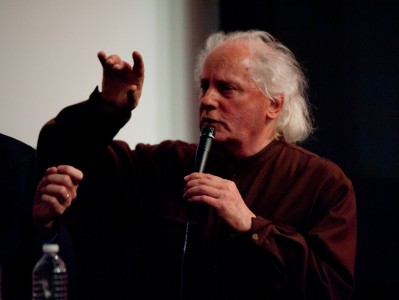
Alain Gomis

Wang Bing
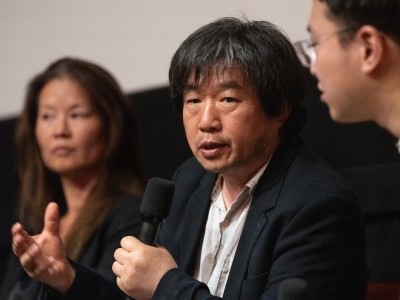
Hamaguchi Ryusuke
